
Top Roles and Responsibilities of Digital Marketers
Oct 24, 2024 4 Min Read 1983 Views
(Last Updated)
Digital marketing has become the backbone of business growth in the online world, with marketers playing crucial roles across various digital platforms. From driving search engine visibility to managing social media and analyzing data, digital marketers employ a range of strategies to engage audiences and optimize performance.
In this article we will discuss the key roles and responsibilities of digital marketers, providing a comprehensive look into the skills, tools, and tactics necessary to succeed in today’s competitive digital landscape.
Table of contents
- A Brief Introduction to Digital Marketing
- Main Components of Digital Marketing
- How Digital Marketing Works: The Technical Process
- Roles and Responsibilities of Digital Marketers
- Key Digital Marketing Skills
- Key Features and Applications of Digital Marketing
- Concluding Thoughts…
- FAQs
- What are the main responsibilities of a digital marketer?
- What is the role of a digital marketing team?
- What skills are needed in digital marketing?
- What is the role of a digital marketing agency?
- What is SEO in digital marketing?
A Brief Introduction to Digital Marketing
Digital marketing refers to the use of digital channels—such as search engines, social media, email, and websites—to promote products, services, or brands. It differs from traditional marketing by focusing on highly measurable, data-driven approaches to reach global audiences and increase customer engagement.
Main Components of Digital Marketing
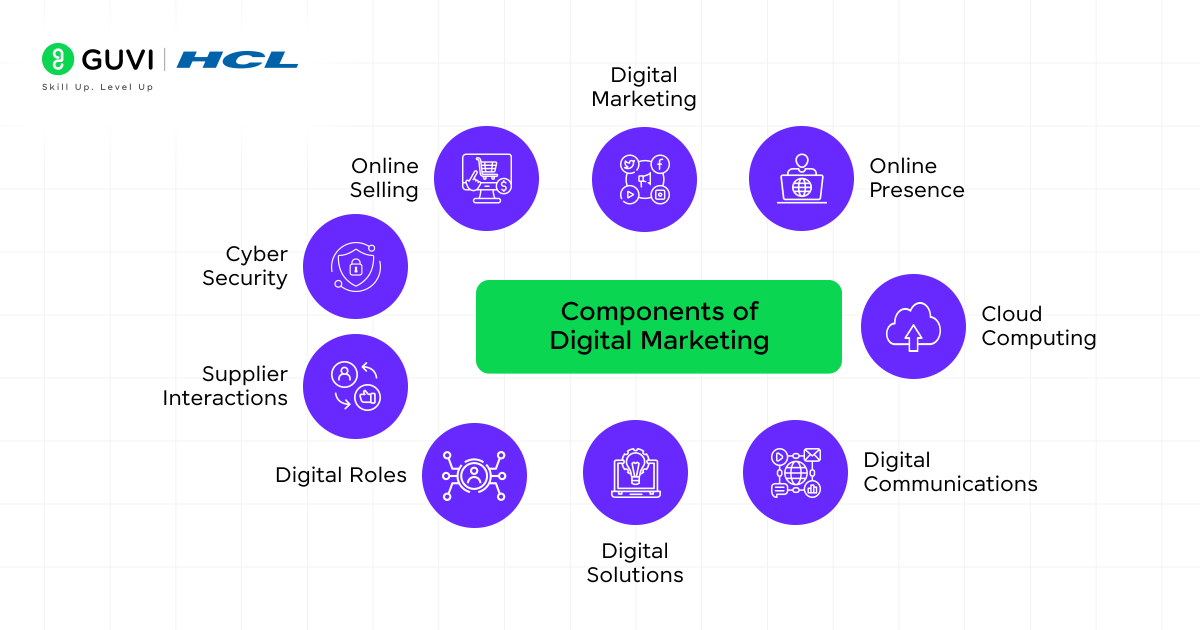
| Component | Description |
| SEO (Search Engine Optimization) | Optimizing websites to achieve higher rankings on search engine result pages (SERPs) organically. Key elements include keyword optimization, technical SEO, and backlinks. |
| SEM (Search Engine Marketing) | Paid advertising strategies to achieve immediate visibility. SEM encompasses Google Ads, paid search, and display advertising. |
| Content Marketing | Creating valuable content that attracts, informs, and retains an audience while driving conversions. This includes blogs, videos, eBooks, and infographics. |
| Social Media Marketing | Managing social media platforms to foster engagement and build brand loyalty. It also involves paid advertising and organic outreach on platforms like Facebook, LinkedIn, etc. |
| Email Marketing | Sending targeted, personalized emails to a segmented list, aiming to nurture leads or engage customers. |
| PPC (Pay-Per-Click) | Paid media strategy where businesses pay for each click on their ads, primarily used for search engine advertising. |
How Digital Marketing Works: The Technical Process
Digital marketing integrates various channels and tools to create a unified, cohesive strategy. The key components and how they work in conjunction are outlined below:

| Stage | Process | Tools & Techniques |
| Attract | Use SEO, SEM, and content marketing to attract relevant traffic to the website or landing pages. | SEO tools (Ahrefs, Moz), Content Management Systems (WordPress). |
| Engage | Engage visitors through informative content, interactive social media campaigns, and personalized email newsletters. | Email marketing platforms (Mailchimp), Social tools (Buffer, Hootsuite). |
| Convert | Leverage optimized landing pages, A/B tested CTAs, and remarketing strategies to convert visitors into leads or customers. | Google Analytics (conversion tracking), Hotjar (heatmaps). |
| Nurture | Use CRM systems and marketing automation tools to nurture leads and build lasting relationships with customers. | HubSpot CRM, ActiveCampaign. |
| Optimize | Measure and refine strategies by analyzing performance metrics such as CTR, CPC, and ROAS. | Google Analytics, SEMrush, Optimizely. |
Roles and Responsibilities of Digital Marketers
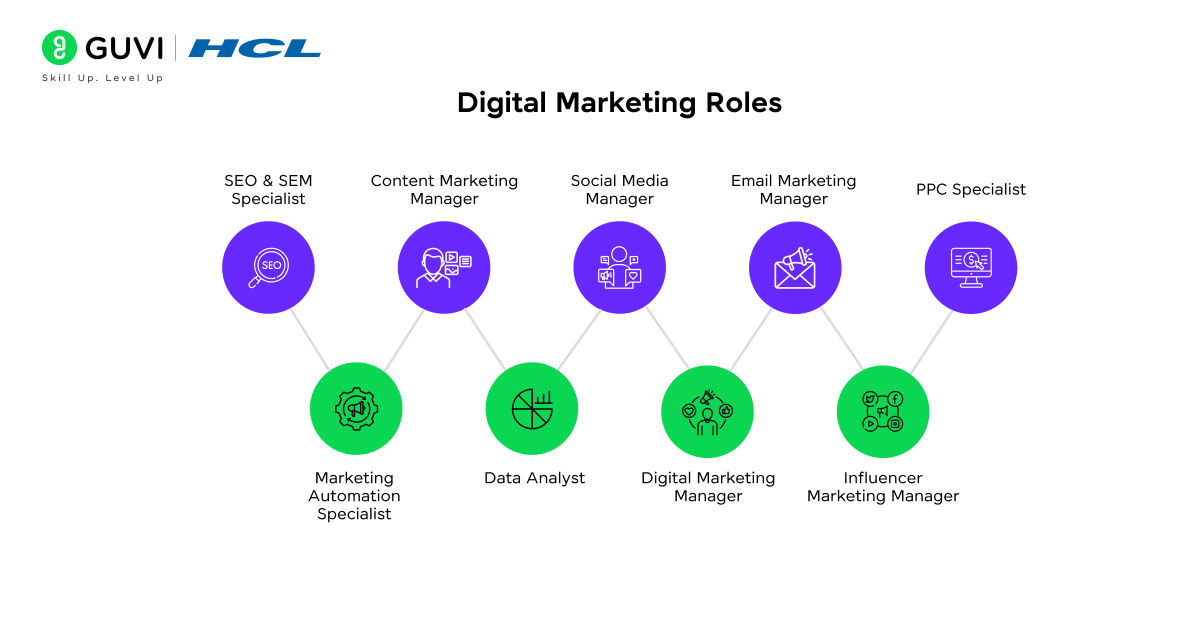
- SEO & SEM Specialist
As previously mentioned, SEO (Search Engine Optimization) and SEM (Search Engine Marketing) specialists focus on improving visibility on search engines. They work to enhance organic traffic while managing paid campaigns.
- Key Responsibilities:
- SEO: Implementing on-page and off-page SEO strategies, backlinking, optimizing for mobile, and improving site speed.
- SEM: Creating and optimizing paid campaigns on search engines like Google and Bing.
Average Salary: ₹3.5LPA to ₹8LPA
- Content Marketing Manager
Content marketing is a strategy to attract customers through valuable content. This role requires balancing creativity with SEO tactics to ensure content ranks well on search engines.
- Key Responsibilities:
- Strategy Development: Creating long-term content strategies and editorial calendars.
- SEO Integration: Ensuring content includes SEO best practices.
- Content Optimization: A/B testing content formats and analyzing performance metrics.
Average Salary: ₹4.5LPA to ₹12LPA
- Social Media Manager
The role has evolved to manage both organic and paid social media efforts. Social media managers are responsible for building brand awareness and driving engagement through various platforms like Facebook, Instagram, LinkedIn, etc.
- Key Responsibilities:
- Strategy Development: Crafting social media content plans aligned with brand voice.
- Analytics: Monitoring KPIs (engagement, reach, impressions) and tweaking campaigns accordingly.
- Platform-Specific Strategies: Tailoring content and paid ads for optimal performance on different platforms.
Average Salary: ₹4LPA to ₹9LPA
- Email Marketing Manager
Email marketing managers build strategies that ensure effective communication with leads and existing customers through targeted emails.
- Key Responsibilities:
- Segmentation: Using data to segment audiences based on behavior, interests, etc.
- Campaign Automation: Setting up automated workflows for nurturing leads and driving conversions.
- A/B Testing: Running tests on subject lines, layouts, and CTAs to improve email performance.
Average Salary: ₹4LPA to ₹10LPA
Would you like to become a Digital Marketer? Then GUVI’s Digital Marketing Course will be the resource that definitely takes you there.
This program provides a hands-on learning experience with modules in key areas such as Search Engine Optimization (SEO), Social Media Marketing, Email Marketing, and Pay-Per-Click (PPC) advertising.
The curriculum focuses on practical applications, allowing you to work on real-life projects and campaigns. It also covers advanced tools like Google Analytics and Google Ads for data-driven decision-making.
- PPC Specialist
Pay-per-click (PPC) marketing is essential for businesses looking for instant visibility on search engines and social platforms. PPC specialists manage these paid campaigns to drive traffic and conversions.
- Key Responsibilities:
- Keyword Research: Identifying the most profitable keywords to target.
- Budget Management: Allocating budget across platforms to maximize ROI.
- Campaign Optimization: Continuously optimizing campaigns through split testing and performance analysis.
Average Salary: ₹3LPA to ₹8LPA
- Marketing Automation Specialist
Automation is key to scaling digital marketing efforts. A marketing automation specialist sets up automated workflows to optimize processes like lead nurturing, customer segmentation, and personalized outreach.
- Key Responsibilities:
- Automation Strategy: Developing workflows for email sequences, social media posts, and lead scoring.
- Lead Nurturing: Automating communications based on the customer journey.
- CRM Management: Using tools like HubSpot or Marketo for segmentation and automation.
Average Salary: ₹5LPA to ₹12LPA
- Data Analyst
Data is at the heart of modern digital marketing. A data analyst focuses on interpreting campaign performance and providing actionable insights to optimize strategies.
- Key Responsibilities:
- Tracking & Reporting: Monitoring campaign performance across all channels.
- Data Visualization: Presenting findings using dashboards and reports.
- Predictive Analysis: Using historical data to forecast future trends and customer behavior.
Average Salary: ₹4LPA to ₹10LPA
- Influencer Marketing Manager
Influencer marketing is rapidly growing, and managing relationships with influencers is crucial. This role focuses on identifying influencers, negotiating partnerships, and managing campaign deliverables.
- Key Responsibilities:
- Influencer Outreach: Identifying relevant influencers based on audience alignment.
- Campaign Management: Managing deliverables, contracts, and content schedules.
- Performance Tracking: Analyzing the ROI of influencer campaigns based on engagement, reach, and conversions.
Average Salary: ₹5LPA to ₹12LPA
- Digital Marketing Manager
Digital Marketing Managers oversee the overall digital marketing strategy, coordinating with different teams to ensure brand consistency and campaign effectiveness. Their role is crucial in aligning the business’s marketing goals with online strategies.
Key Responsibilities:
- Strategy Development: Crafting comprehensive digital marketing plans, including SEO, SEM, social media, and content strategies.
- Campaign Oversight: Managing and optimizing multi-channel campaigns, ensuring alignment with business goals.
- Team Coordination: Leading cross-functional teams including SEO, PPC, social media, and content teams.
- Performance Analysis: Tracking KPIs and providing insights to improve performance.
Average Salary: ₹8LPA to ₹18LPA
Key Digital Marketing Skills
Digital marketers need a blend of technical and creative skills. Here’s an in-depth look at the critical competencies:
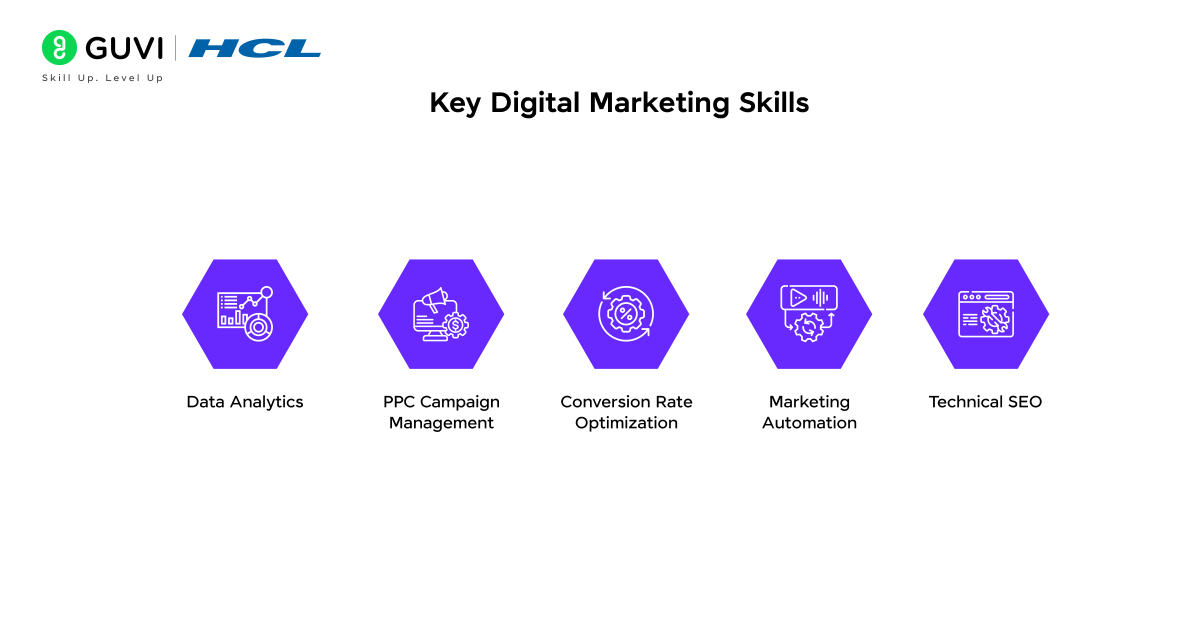
| Skill | Description | Tools |
| Data Analytics | Understanding of data analytics to track and interpret campaign performance metrics, user behavior, and ROI. | Google Analytics, HubSpot, SEMrush. |
| PPC Campaign Management | Expertise in managing and optimizing PPC campaigns to improve the click-through rate and minimize cost-per-click. | Google Ads, Facebook Ads Manager, LinkedIn Ads. |
| Conversion Rate Optimization | A/B testing, UX improvements, and CTA optimizations to enhance conversion rates across websites and landing pages. | Optimizely, Crazy Egg, Hotjar. |
| Marketing Automation | Utilizing automation platforms to scale email marketing, customer segmentation, and lead nurturing efforts. | Mailchimp, Marketo, ActiveCampaign. |
| Technical SEO | Proficient in improving site performance by optimizing page speed, mobile compatibility, and crawlability through server-side tactics. | Screaming Frog, Ahrefs, SEMrush. |
Key Features and Applications of Digital Marketing
| Feature | Description | Example |
| Personalization | Delivering content that is tailored to individual users based on their behavior, preferences, and interactions. | Measuring the performance of campaigns in real time allows for immediate optimization and adjustments. |
| Real-Time Analytics | Measuring the performance of campaigns in real-time allows for immediate optimization and adjustments. | Using Google Analytics to monitor the performance of a live ad campaign and adjust targeting. |
| Automation | Automating repetitive marketing tasks such as email sequences, social media posting, and lead segmentation to save time and increase efficiency. | Scheduling social posts using Buffer; automating customer journey emails using Mailchimp. |
| AI and Machine Learning | Leveraging AI to analyze large datasets, predict customer behavior, and improve marketing effectiveness. | AI-powered chatbots for customer support; predictive analytics tools like Salesforce Einstein. |
Concluding Thoughts…
Digital marketing is an intricate and dynamic field that requires a blend of technical prowess and creative strategy. The evolving landscape demands that digital marketers stay current with the latest trends, tools, and platforms while being able to analyze and optimize campaigns in real time.
The responsibilities of digital marketers—ranging from SEO to content creation to data analytics—play a pivotal role in a brand’s online success. For businesses looking to thrive in the digital age, hiring well-rounded digital marketers equipped with the right technical skills and tools is no longer a luxury but a necessity.
Hence, I hope this guide helps you step into a digital marketing career packed with information, do let us know what you thought of it in the comments section below.
FAQs
1. What are the main responsibilities of a digital marketer?
A digital marketer is responsible for creating online campaigns, optimizing SEO, managing social media, analyzing website traffic, and driving lead generation.
2. What is the role of a digital marketing team?
A digital marketing team plans and executes strategies for promoting brands online, including content creation, SEO, social media, email marketing, and paid ads.
3. What skills are needed in digital marketing?
Key skills include SEO, content marketing, social media management, data analysis, email marketing, and PPC advertising.
4. What is the role of a digital marketing agency?
A digital marketing agency helps businesses grow online by offering services like SEO, social media management, paid advertising, and content marketing.
5. What is SEO in digital marketing?
SEO (Search Engine Optimization) is the practice of improving a website’s visibility on search engines to attract more organic traffic.


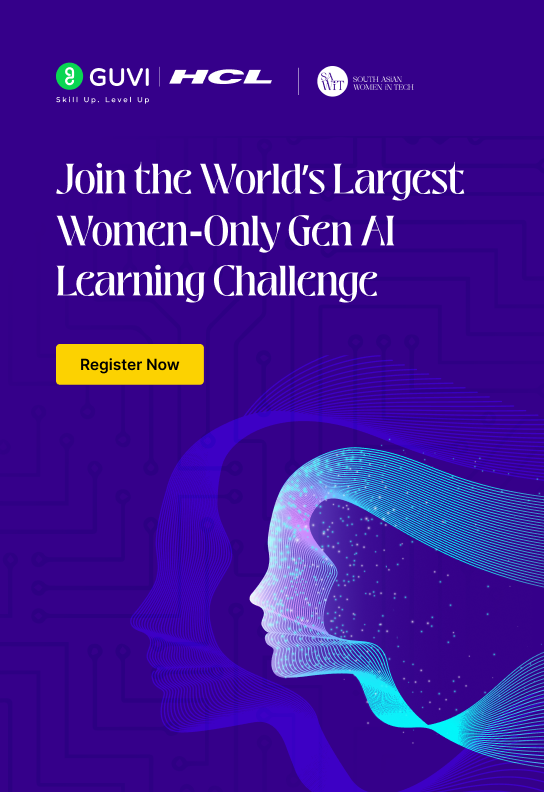

















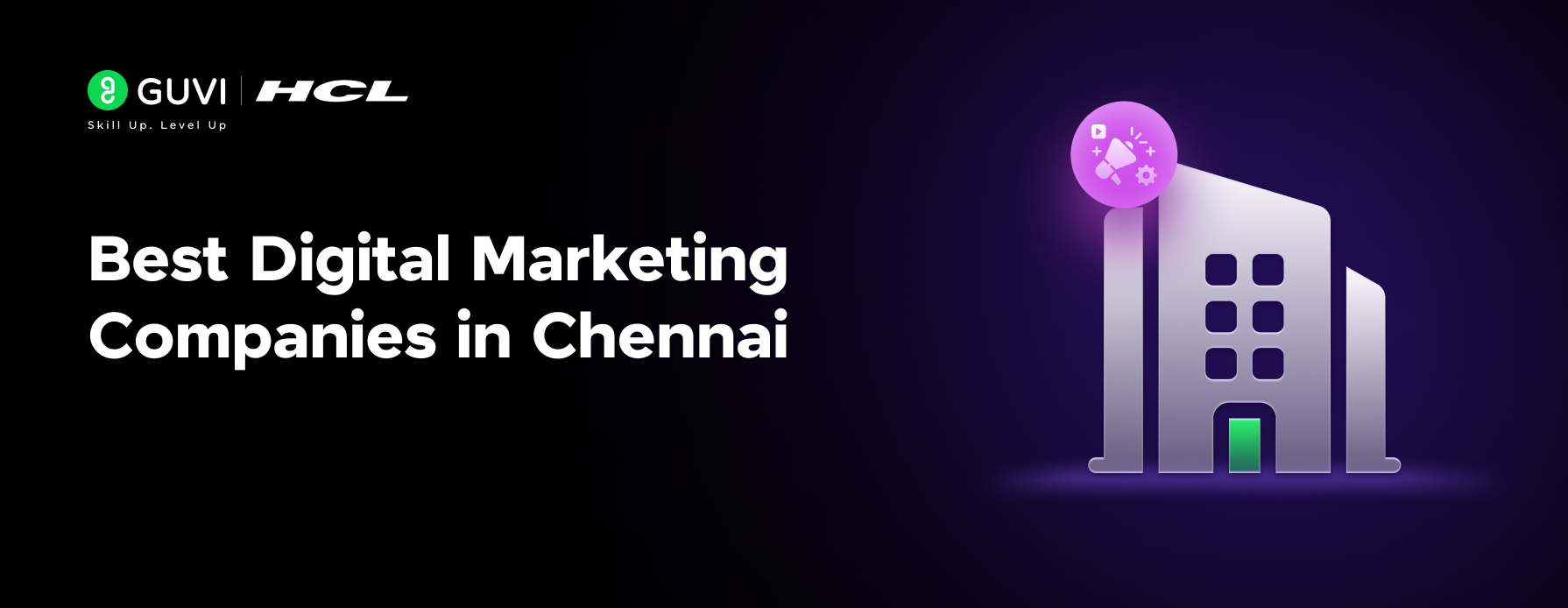
![10 Best WordPress Project Ideas [With Plugins] 7 WordPress Project Ideas](https://www.guvi.in/blog/wp-content/uploads/2024/10/Wordpress_Project_Ideas.png)
![Best Social Media Project Ideas [With Source Code] 8 Social Media Project Ideas](https://www.guvi.in/blog/wp-content/uploads/2024/10/Social_Media_Project_Ideas.png)
![10 Unique SEO Project Ideas [With Source Code] 9 SEO Project Ideas](https://www.guvi.in/blog/wp-content/uploads/2024/10/SEO_Project_Ideas.png)
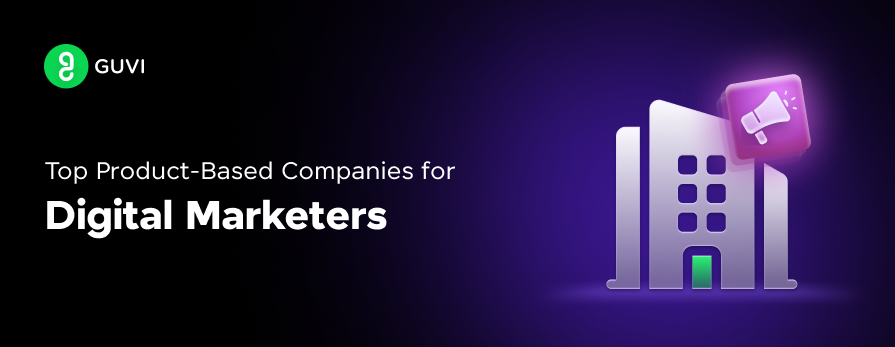
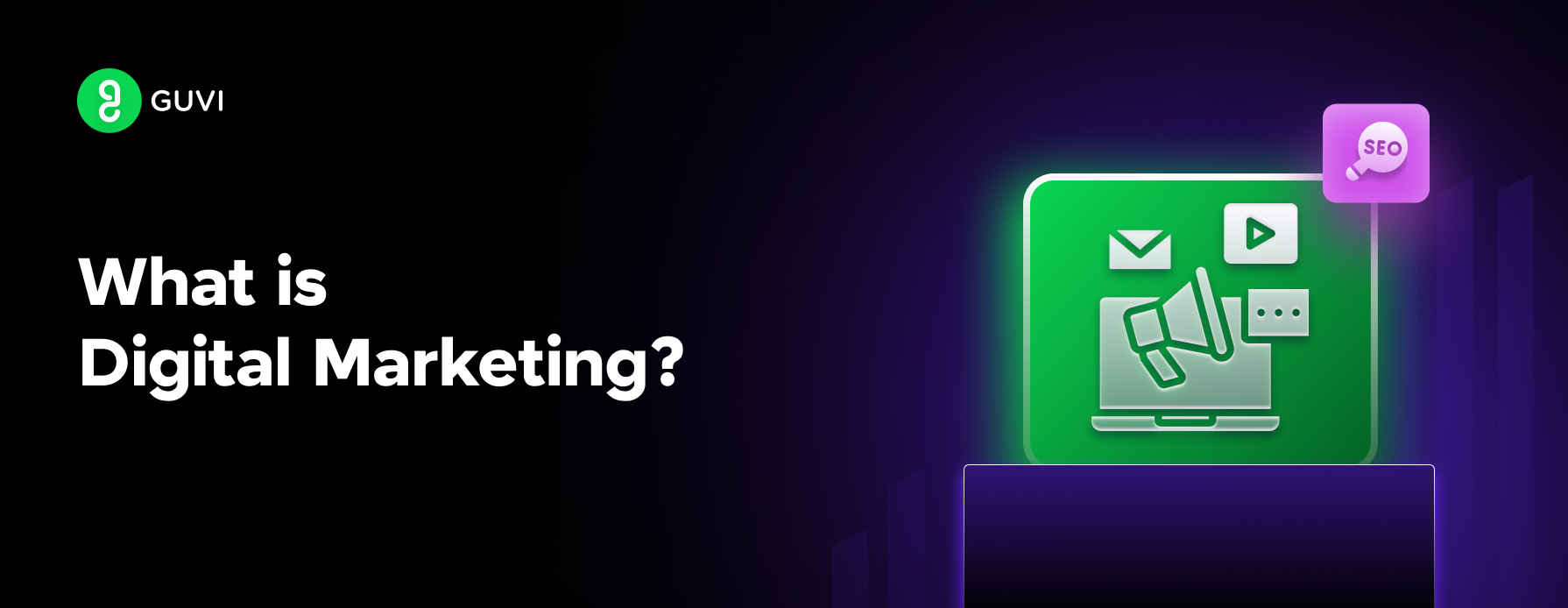
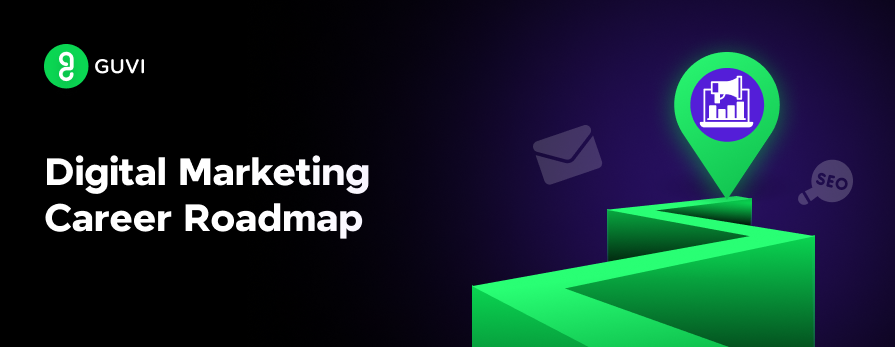
![Best Digital Marketing Courses [Free + Paid] 13 Best Digital Marketing Courses](https://www.guvi.in/blog/wp-content/uploads/2023/09/Best-Digital-Marketing-Courses.png)
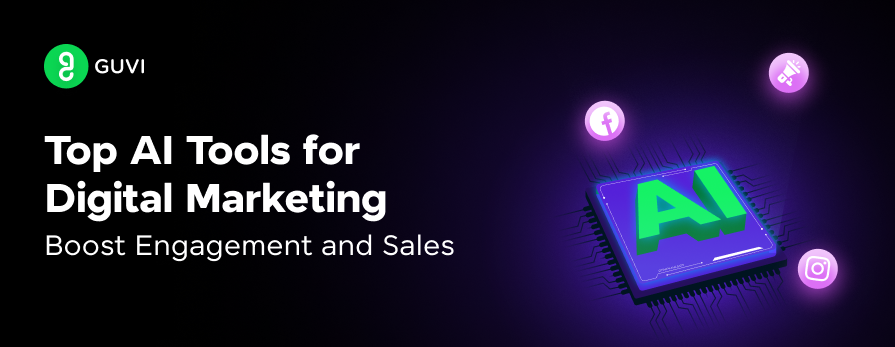
Did you enjoy this article?